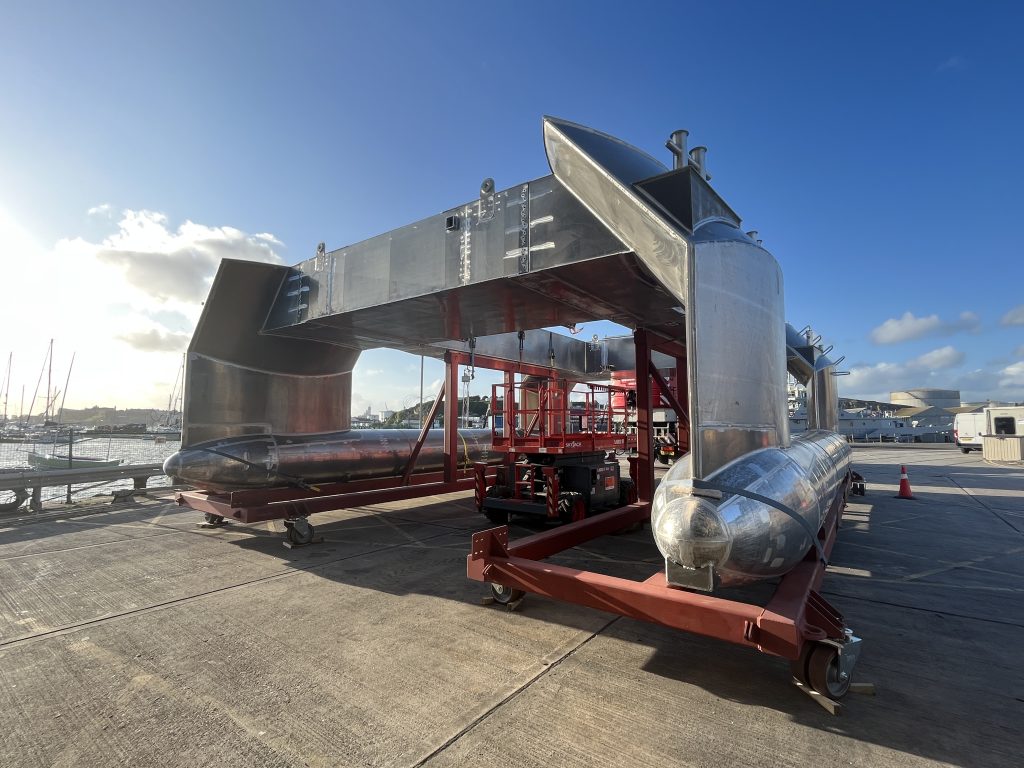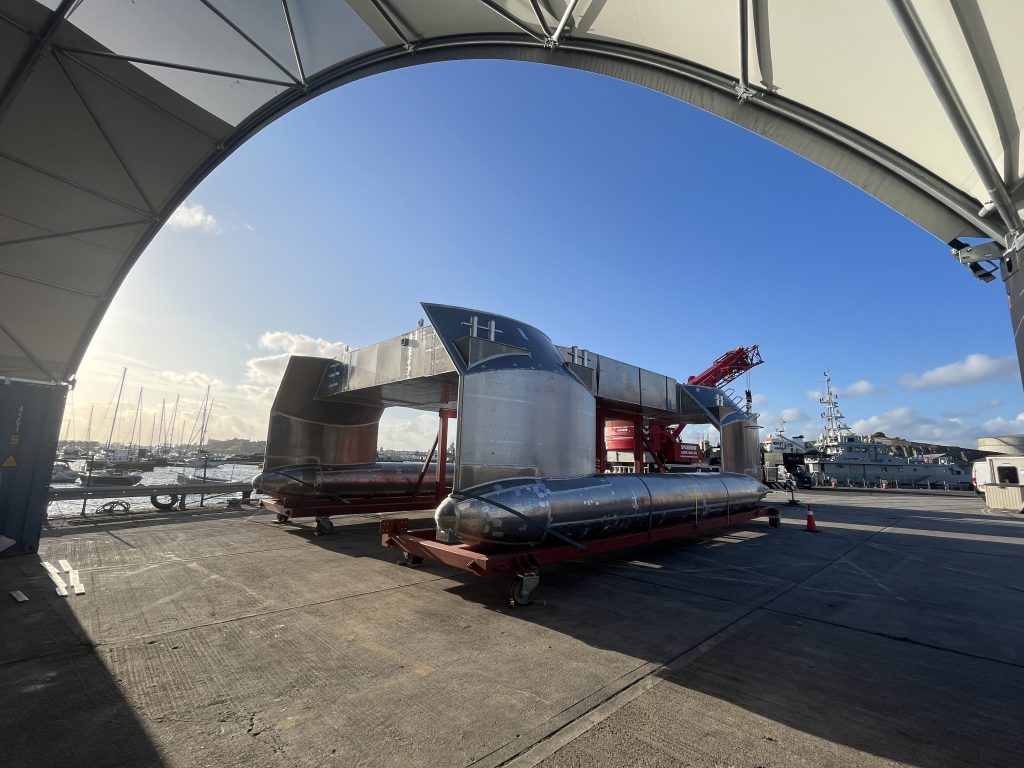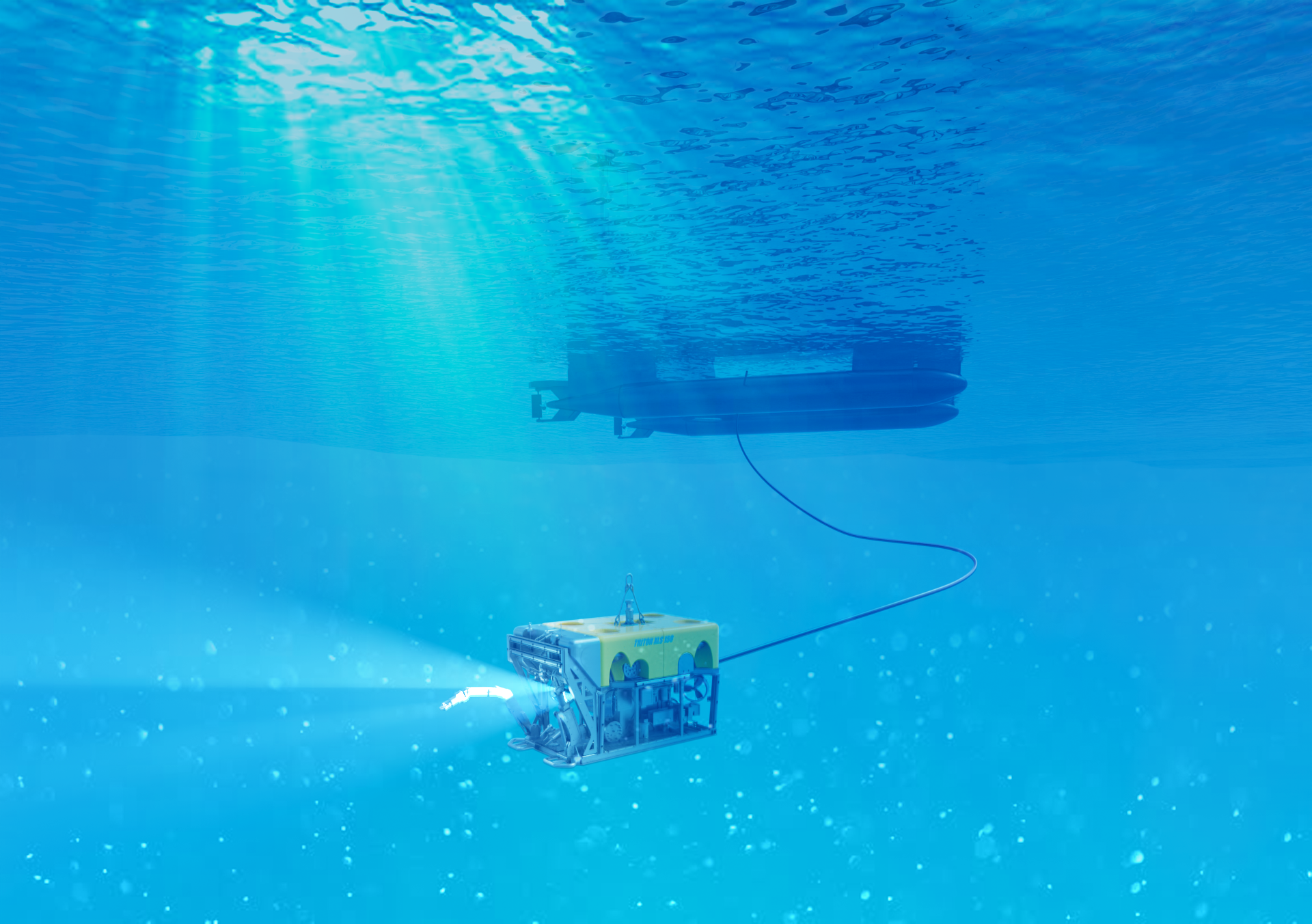Advanced maritime autonomy developer, Robosys Automation, supported by USV manufacturer, ACUA Ocean, and Offshore Renewable Energy Catapult (OREC), have jointly secured grant funding through Innovate UK.
The funding is for a specialist project exploring Collaborative Autonomy in USVs and ROVs across Maritime Autonomous Surface Ships (MASS) operations.
The Collaborative Automations for Subsea Intervention (C.A.S.I) project led by Robosys Automation aims to address a growing market need for improving operation and maintenance (O&M) and inspections of offshore assets with smarter, zero-emission, collaborative USV-ROV technologies.
Robosys Automation will be delivering two work packages, which include Multiple Objective Autonomous Adaptive Path Optimization, specifically focusing on Weather routing, and Fuel consumption optimization for traditional fuels and hydrogen.
The second package is for the design of software architecture and simulation of Collaborative Autonomy between Uncrewed Surface Vessels (USVs) and Remotely Operated Vehicles (ROVs), and the development of software algorithms for station keeping and obstacle avoidance in uncharted offshore wind farms (OWF).
This feasibility study includes the software and algorithm design, and architecture required for the vessel to arrive on station safely and efficiently, maintain station and collaborate with, track, and autonomously follow an ROV.
The global asset integrity management total addressable market is projected to grow from £17bn in 2021 to £21.5bn by 2026. This rapid market growth is expected to increase the demand for subsea intervention vessels required.
Maintenance, inspections and intervention cost ~ £18m per year for a 1GW offshore wind-farm, with £900m @50GW anticipated by 2030 in UK2. Current state-of-the-art subsea inspection requires Remote Operated Vehicles (ROVs) deployed from larger heavy diesel-burning crewed vessels which are limited by safety, crewing, vessel availability and operational sea states.
The project will help the maritime autonomy sector to further advance dual-use operations such as surveying, monitoring of critical offshore and underwater infrastructure, offshore energy, and marine science, to increase productivity, profitability, safety, and sustainability through these novel technologies.
The route optimisation will increase the endurance of the vessel overcoming the impact of hydrogen’s low volumetric density.
Other aspects of the project include engineering feasibility of the ROV’s launch and recovery systems (LARS), combined with the related impact on a vessel’s stability in these scenarios.
The project’s success will be defined through software architecture design and algorithms primarily lead by Robosys’ development team to deliver Multiple Objective Autonomous Adaptive Path Optimisation.
Additionally, ACUA Ocean will spearhead the design of a new LARS and ROV that will both be technically advanced and commercially feasible, which will feature enhanced vessel stability for full open ocean operations and launch and recovery of payloads in over 4m significant wave heights.
OREC will develop the test and evaluation criteria for the LARS and conduct a Life Cycle Assessment.
Nigel Lee, CSO of Project Lead, Robosys Automation, commented, “We are all delighted to have been awarded this significant funding, and look forward to commencing the rolling out of the project with our collaborators. This award reflects the importance of continuing to research and develop the maritime autonomy sector, to further support operational efficiency, enhance safety at sea, and actively drive decarbonisation.”
The MASS Collaborative Autonomy Project will reveal its findings in Spring 2025.
ABOUT THE CASI PROJECT
The Collaborative Automations for Subsea Intervention (C.A.S.I) project is led by Robosys Automation.
This C.A.S.I. project will explore the engineering feasibility of integrating a modular launch and recovery system into the moonpool to enable the deployment of remotely operated vehicle (ROV) payloads to expand on the benefits and opportunities of the H-USV platform.
ACUA Ocean has developed a zero-emission, hybrid-electric Uncrewed Surface Vessel (USV Pioneer) which will be capable of open ocean transits and transportation of a 6.5ton payload. The vessel has been designed with modularity in mind, allowing for rapid assembly and mobilisation to any site around the world. It is also designed with a utilitarian moonpool with the size to accommodate a 20ft ISO container footprint for an array of task-specific payloads.

Robosys has developed proprietary artificial intelligence (AI) and machine learning (ML) techniques to enable the Robosys VOYAGER AI software to act as the primary control unit for an uncrewed vessel which will be utilised within this project and future technology demonstrations.
The C.A.S.I project will also develop the feasibility and simulation of software for a collaborative remote and autonomous vessel control system including adaptive routing and mission efficiency utilising features such as weather data, engine performance optimisation, fuel consumption, and obstacle avoidance, vessel station keeping for launch and recovery of the ROV, and the collaborative autonomy to enable the USV to autonomous track the ROV.
The project will ultimately determine the technical, commercial, and economic feasibility of a LARS integrated into ACUA’s H-USV and the LARS control systems to serve multi-UxV missions for collaborative autonomous subsea intervention and light inspection.
This project is part of the Smart Shipping Acceleration Fund (SSAF), funded by the UK Department for Transport (DfT) and delivered by Innovate UK. SSAF is part of the Department’s UK Shipping Office for Reducing Emissions (UK SHORE) programme, a £206m initiative focused on developing the technology necessary to decarbonise the UK domestic maritime sector.
ABOUT ROBOSYS AUTOMATION
Since 2002, Robosys Automation has been regarded as the world leader in maritime autonomy and smart shipping applications, delivering pioneering and intelligent navigation solutions to crewed, lean-crewed and autonomous vessels, USVs and ships, from 3m to 320m.
Headquartered at the UK’s National Oceanography Centre, with offices in USA, India, and Canada, Robosys’ solutions are proven and boast full IMO Degree 4 Maritime Autonomy capability.
Robosys has two decades of experience in developing and supporting AI maritime autonomy and smart shipping solutions with its platform, propulsion, and sensor-agnostic software; for both operational purposes, and for training simulation in synthetic environments.
Robosys’ solutions include its ground-breaking VOYAGER AI software which transforms any motorised vessel into a fully autonomous Unmanned Surface Vessel (USV); which features independent navigation, collision and obstacle avoidance, anti-grounding and dynamic route optimisation.
In addition, Robosys offers numerous options to complement VOYAGER AI, including COLREGS-compliant Collision Avoidance Decision Aid (CADA) applications, to enhance the safety in the support of crewed and lean crewed watchkeepers. Other options include Voyager Platform Control providing Remote Steering, Engine Control and Propulsion Control, together with Voyager Platform Management, providing Alarm Monitoring, together with Switch & Relay Controlling.
Robosys’ international partners include the Australian Maritime College (AMC Search), Maritime Research Institute of Netherlands (MARIN) and the Marine Robotics Innovation Centre (MRIC) at the UK’s National Oceanography Centre (NOC).
Find out more about Robosys Automation at www.robosysautomation.com.
ABOUT ACUA OCEAN
Founded by brothers Neil and Mike Tinmouth in 2021, ACUA Ocean is a UK-based startup designing and developing unmanned surface vessels (USVs) for ocean monitoring and data collection. ACUA’s autonomous systems deliver enhanced open ocean platform-as-a-service capabilities for the launch and recovery of sensor and system payloads.
Website: www.ocean.tech Contact: info@ocean.tech
About ACUA Ocean’s Pioneer Class USV
ACUA Ocean’s USV, which was recently nominated for the Concept Vessel Design of the Year award at the Electric & Hybrid Marine Expo 2024, is currently in-build at the AMC shipyard on the Isle of Wight. It is scheduled to undergo harbour and site acceptance testing in Q4 2024 ahead of demonstrations and pilot projects early next year.
ACUA Ocean’s platform can support the deployment of modular sensors and system payloads of up to 6.54 tonnes from a 20ft ISO footprint in the moonpool. The unique SWATH vessel design differentiates the Pioneer USV from competitors by delivering the stable platform necessary for robotic offshore over-the-horizon operations.
Wave tank testing and digital simulations conducted by the University of Southampton Marine and Maritime Institute show the USV Pioneer outperforming the stability of a 40-metre monohull vessel, meeting the increasing need of end-users for high-quality data and increased reliability in open ocean conditions.

ABOUT OFFSHORE RENEWABLE ENERGY CATAPULT (OREC)
Established in 2013, ORE Catapult is the UK’s leading technology innovation and research centre for offshore renewable energy. OREC exists to accelerate the development of offshore wind, wave and tidal energy technologies in the UK.
ORE Catapult enables innovation and accelerates the development of offshore renewable energy, growing businesses and creating jobs throughout the UK.
Through OREC’s world-class testing and research programmes and its unique centres of excellence, OREC works with industry, academia and government to improve technology reliability and enhance knowledge, directly impacting the cost of offshore renewable energy. Visit www.ore.catapult.org.uk to find out more.
THE UK SHORE – DfT UK GOVERNMENT R&D FUNDING
The UK Government has allocated £206m Research and Development (R&D) funding to UK SHORE, a programme within the Department for Transport focused on decarbonising the maritime sector. UK SHORE is delivering a suite of interventions between 2022 and 2025 aimed at accelerating the design, manufacture and operation of UK-made clean maritime technologies and unlocking an industry-led transition to Net Zero. Flagship competitions include the Zero Emission Vessels and Infrastructure (ZEVI) scheme and the Clean Maritime Demonstration Competition (CMDC).
The UK SHORE programme includes the Smart Shipping Acceleration Fund which provides match-funding to help bring pre-commercial smart shipping technologies closer to market readiness. SSAF allocated £8m to 31 projects across the UK to deliver innovative feasibility studies between November 2024 – March 2025. The projects are supported by over 103 partners and will leverage more than £3m of private investment.
£8 million has been invested across three pioneering programmes designed to reduce the UK’s shipping emission, with the latest UK Shipping Office for Reducing Emissions (UK SHORE) programme winners have been announced by the Department for Transport (DfT) in partnership with Innovate UK. Each programme was set with its own unique challenge, with the overarching objective of reducing the maritime industry’s emissions.
Across all three programmes, 32 winners will collectively receive up to £8 million to test innovative solutions, from artificial intelligence maritime traffic planning and autonomous vessels to establishing green shipping routes between the Netherlands and Ireland.
The funded projects
– Smart Shipping Accelerating Fund
A programme focused on the decarbonisation of the maritime industry using digital solutions. With 30 winners having successfully won grants for their proposed projects, the programme will run from 1 November 2024 to 31 March 2025.
Winners include the following projects.
– Project Sunflower
This is a groundbreaking initiative, looking to create autonomous solutions for Terminal Tractors at ports, a significant contributor to greenhouse gases in the shipping supply chain.
– Project BlueWater
A project that will explore how multi-use drones can improve smart shipping, port efficiency, reduce greenhouse gas emissions, and boost air quality.
– EcoRoutePlanner
This project is looking to bring advanced digital tools for smart route planning and operational efficiency for crew transfer vessels responsible for servicing off-shore wind farms.
– CMDC5 International Green Corridors Fund: UK-Netherlands feasibility studies
– Green North Sea Shipping Corridor
The winning project looks to establish a Green Shipping Corridor (GSC) between Port of Tyne (UK) and IJmuiden (Netherlands) by decarbonising the route that is currently served by ageing vessels and transitioning to methanol-fuelled RoRo and RoPax vessels.
This will also include testing the operational feasibility of these vessels and the landside infrastructure to support its rollout.
– CMDC5 International Green Corridors Fund: UK-Ireland feasibility studies
This fund was tasked within finding a solution to the shipping route between Dublin and Holyhead, which is both the shortest and busiest route in the Irish sea.
– Greening the Irish Sea: The Central Corridor
The winning project will be using the fund to validate and test methanol against other fuel alternatives, while also exploring methanol bunkering and production at each end of the corridor.
– Greener technologies and processes
James Lovett, Maritime Lead at Innovate UK, comments:
Like so many transport industries, transitioning to green technologies has historically been a challenge for the maritime sector. With extremely busy shipping channels and routes reliant on old technologies, integrating sustainable solutions whilst maintaining current levels of activity is a difficult process.
UK SHORE’s funding programmes have all been commissioned with the objective of reducing the UK maritime industry’s carbon emissions. Each of the 32 announced winners present their own innovative projects, looking to accelerate the rollout of greener technologies and processes throughout the industry.
ABOUT UKRI + INNOVATE UK
UK Research + Innovation (UKRI) invests in research and innovation to enrich lives, drive economic growth, and create jobs and high-quality public services across the UK. UKRI helps researchers develop new skills and enabling them to further their careers, and enable collaboration and engagement across multiple domains. UKRI improve the capabilities across the research system, within the UK and internationally developing world class infrastructure, and supporting a multicultural research culture. www.ukri.org/
Innovate UK, part of UKRI, is the UK’s Innovation Agency, helping companies to grow through their development and commercialisation of new products, processes and services, supported by an innovation ecosystem that is agile, inclusive and easy to navigate. www.ukri.org/councils/innovate-uk/
PRESS CONTACT
For further information and to arrange an interview please contact Hannah Kent Colls, Director, at Watermark Communications, email hannah@watermark360.com or phone +44 (0)7876 541 876.
























